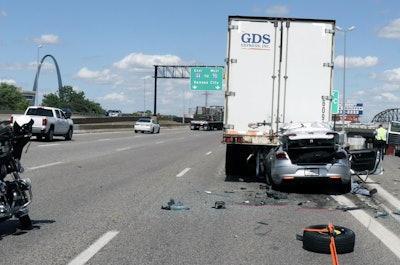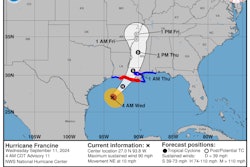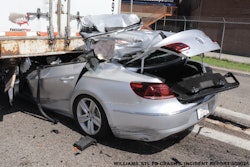
Taron Tailor, 30, and his passenger, Nicholas Perkins, 23, were killed instantly May 19, 2019, when the Volkswagen Tailor was driving along Interstate 44/55 rear-ended a trailer made by the Wabash Corporation.
Just more than five years later, a St. Louis jury last week reached a $462 million verdict against trailer manufacturer Wabash National. The carrier involved, Ohio-based GDS Express, went out of business barely six months after the crash.
Despite the trailer having met the National Highway Traffic Safety Administration (NHTSA) rear impact guard (RIG) standards in place for its model year, Simon Law attorneys John G. Simon and Johnny M. Simon, who tried the case locally, claimed the trailer failed to have adequate underride guard protection; the trailer’s underride guard was improperly designed; the underride guard was manufactured with insufficient bonds, welds and structural support; the underride guard failed to appropriately minimize intrusion of the trailer into the occupant compartment; the underride guard failed and snapped off in the incident; the underride guard was not crashworthy; and the underride guard failed to have adequate corrosion protection and allowance.
Transportation attorney Matthew Leffler, known as The Armchair Attorney, noted that this case in particular highlights a distinction between a product liability (and strict liability) claim and a negligence claim.
In the case of product liability, it all goes back to the condition at the time of manufacturing and the "reasonably anticipated use" of the product, he said. While the 2004 Wabash trailer met NHTSA underride standards in place at the time, Leffler said the plaintiffs' attorneys successfully argued that the standard should require rear impact guards that can handle at least 40 mph rear impacts, not 30 mph.
Wabash unsuccessfully countered that "reasonably anticipated use" did not include preventing underride "at a speed 50% higher than the speed for which the RIG was designed," and contended that, despite precedent to the contrary, the jury was prevented from hearing critical evidence in the case, including that the driver’s blood alcohol level was over the legal limit at the time of the accident, and that neither the driver nor his passenger was wearing a seatbelt.
That this case wasn't trying to establish negligence, Leffler theorized the judge likely saw those pieces of evidence as something that would bias a jury in deciding product liability, thus did not allow them to be presented to jurors.
"The very fundamental thing in this Wabash case has to do with what we call strict liability," he said. "It's a type of product liability that says if you make something, and it's used the way you intended to be used, and it causes something catastrophic or causes some sort of damages, you are responsible. We don't care what the person who got injured did, or what they did to contribute to this. If it was being used the way that it's anticipated, we're just going to ignore the other factors. That's what this really comes down to; this idea of what speed are the underride supposed to prevent?"
According to NHTSA, that speed was 30 mph in 2019 and is now 35 mph, but Leffler said regulatory minimums offer little legal defense in cases such as this.
"I think the FMCSA is probably fine with the 35 mile per hour speed that we have for rear impact guards," he said, "but I think motor carriers are going to have to make a very difficult decision of weighing the pros and cons of 'Do we want to go with what the federal government mandates as the minimum, or are there other options that are cost effective and that drive safety?"
Trucking fleets in the crosshairs
In the initial filing, Simon Law accused GDS Express and its driver involved in the crash of a number of things, including calling the fleet's maintenance practices into question, claiming failure to comply the federal motor carrier rules, regulations, and standards pertaining to underride guard maintenance and inspection.
"Having a manufacturer get tagged for product liability from something they made 20 years ago is weird," Leffler said. "It's something we don't see. That's why it's in the news. But what happens if you're a motor carrier and you run trailers with an ICC (Interstate Commerce Commission) bumper that's designed for 30 miles an hour? Do you convert your fleet? Do you sell off the assets? Nobody knows. But now plaintiff attorneys are going to pivot and go, 'Holy cow, I can sue you because now you should know that ICC is not safe.'"
According to the American Transportation Research Institute's (ATRI) 2024 Analysis of the Operational Costs of Trucking, the average age of a 53-foot trailer is just more than 6 years. Tankers, at 17 years old, are the oldest trailers on the road by average, followed by 45-foot trailers (13.7 years), 33-foot trailers (11.1 years), and flatbeds and 28’ trailers at 10.3 years each. However, even brand new trailers offer carriers no guarantee as those are subject to 35 mph underride minimums versus the 40-plus recommended by lead plaintiff attorney Johnny Simon.
So what is a fleet to do? Leffler recommended having a third-party inspect trailer underride guards and take corrective actions as needed
"I think it makes sense to outsource it, just so you have records of this from both you and the vendor's perspective," he said. "Have an FMCSA certified inspector... do an inspection of the rear doorframe, and do an inspection of the ICC. What many fleets will do these days is they will scrape off all the rust. They'll do a bunch of different things to get the rust away. They'll slap some paint on it. They'll slap some new conspicuity tape and they'll call it done. That makes it look like a safe thing. It looks okay, but it may not be. If you're worried about someone doing an underride on you and suing you and bankrupting you, it would be useful to have some evidence of another company coming in and looking at your ICC and saying, 'Here are the recommendations.'"
Even having an inspection, making repairs or adding a retrofit gives motor carriers no legal safe haven, because any repairs will only bring the bumper back to an FMCSA standard that has already been challenged as insufficient.
"It's a very complicated question," Leffler noted. "I feel terrible for the trailer manufacturers and the motor carriers who now have to live in the world where they could be held responsible for this type of thing... This is just the beginning. This is going to cause a lot of trepidation within the business and, I think, the way we look at maintenance as a predicator for nuclear verdicts is going to be exacerbated. My hope over time is that motor carriers have operating margins to actually maintain things the way they're supposed to... But the big challenge in front of us is how we handle going forward on the equipment maintenance side; to do our best to keep those nuclear verdicts away. Because this is just like the Werner case. How in the world can a motor carrier be held responsible when something happens that is completely outside of their control and they have no ability to influence the outcome, yet they are tagged with what will likely be the end-of-their-company-style litigation. It's absolutely bonkers."
The nearly half-a-billion-dollar award will almost certainly be reduced, as Missouri has lawsuit caps in place that should slash to the punitive total to around $60 million, and Wabash can appeal on any number of grounds. "This is far from over," Leffler predicted.
A unique problem for leasing companies
While no fleet is immune to an underride lawsuit, Leffler noted leasing companies are especially vulnerable due to both the nature of their business and the sheer number of assets they own.
"Their challenges are they don't control those trailers. They're operated by somebody else. Their ability to do a retrofit campaign or modify is limited," he said. "If I'm a leasing company, I just watched my equipment liability risk go up astronomically... Do you start retrofitting your equipment just like motor carrier does? But you have a lot less control over what happens. And that's the concern that I have for the leasing organizations is they're buying the equipment with the understanding that they are sufficient, safe and legal, and they give it to a motor carrier to go off and do what the motor carrier does. But now you're having to ask this question of, "I've got 13,000 trailers that are only a 30 mile per hour rear impact guard. Do I have to do a campaign retroactively and fix them all?' Because 2004 was a long time ago."












